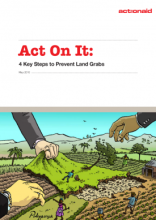Land Library
Welcome to the Land Portal Library. Explore our vast collection of open-access resources (over 74,000) including reports, journal articles, research papers, peer-reviewed publications, legal documents, videos and much more.
/ library resources
Showing items 1 through 9 of 230.The USAID's Investor Survey on Land Rights aimed to provide a more systematic understanding of the drivers of tenure risk to land-based investments from the perspective of the private sector, and of how investors and operators assess, mitigate and are affected by such risks.
Author: Robyn Pharoah/ActionAid
Ten African countries have signed up to the New Alliance for Food Security and Nutrition – the G8 countries’ main strategy for supporting agriculture in Africa that was launched in 2012. As the New Alliance has been under way for three years, some of its likely impacts are becoming clearer.
In 2008, three sugar companies were awarded nearly 20,000 hectares of Economic Land Concessions (ELCs) in Oddar Meanchey province.
Over the past 15 years, tens of millions of hectares of land have been acquired by large investors in developing countries.
In celebration of this year's Earth Day, we sat down with World Wildlife Fund's (WWF) Chris Weaver over Skype to discuss the links between secure land and resource rights and WWF's conservation work in Namibia. Mr.
Each quarter we will interview an expert whose work touches on aspects of land tenure and resource management. These will include evaluation specialists, country experts or USAID staff.
USAID works to improve land and resource governance and strengthen property rights for all members of society, especially women. Currently, USAID is working in 24 countries on land tenure issues and has committed US $300 million to these programs.
The 2003 Maputo Declaration on Food and Agriculture committed signatory countries across Africa to a 10% allocation of national budgets to agriculture by 2008. To bolster the implementation of this commitment, the Comprehensive Africa Agriculture Development Programme (CAADP) was established.







